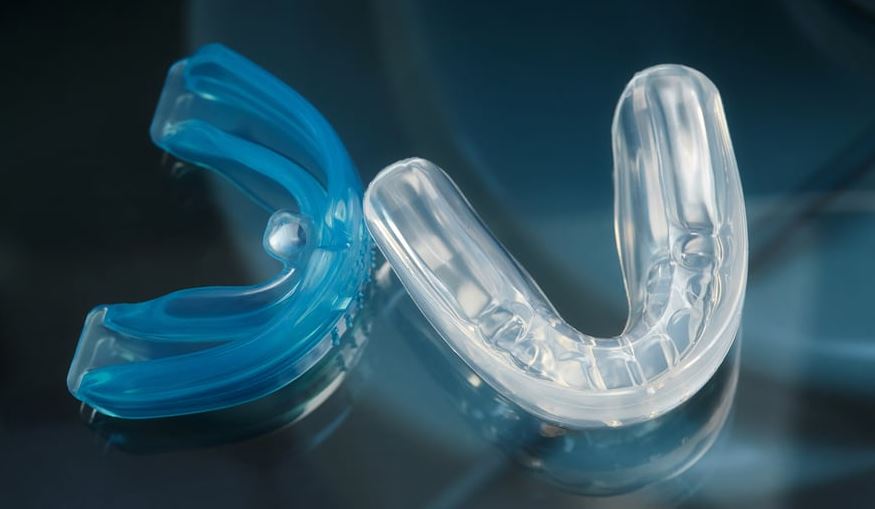
Many of us have heard of (or have used) retainers at one point in our lives. Retainers are often used in orthodontic treatment and can keep our teeth straight, but are not specialized in helping protect our teeth – that falls to mouthguards. That’s why we’re going to discuss how mouthguards provide protection for your teeth.
According to Cleveland Clinic,
“Mouthguards cover your teeth to protect teeth and gums. Custom-fitted mouthguards fit and protect your teeth better than over-the-counter mouthguards. Night guards can ease bruxism (teeth grinding). Kids and adults should wear mouthguards during contact sports or activities like biking.”
Learn more about Mouthguards from WebMD HERE.
Mouthguards provide protection for your teeth and the benefits include:
Talk to your dentist or orthodontist about selecting a mouthguard that will provide the right protection. Although some mouthguards only cover the upper teeth, your dentist or orthodontist may suggest that you use a mouthguard on the lower teeth if you have braces on these teeth.
Related Articles:
Mouthguards provide protection for your teeth and can be used by anyone – children and adults alike.. In fact, with so many kiddos going to school again, it’s important to consider the importance of a mouthguard for sports – such as basketball, soccer, football, volleyball, gymnastics, etc. Even if you or your child only participates in recreational activities, such as skateboarding or hiking, mouthguards are still a great option for protection to remove risk of oral injury.
Mouthguards are also common for adults or children who grind their teeth at night. At Adams Dental Group, we can create custom-fitting mouthguards that are comfortable and fit perfectly within your mouth for comfortable sleeping.
Similar to a retainer, you can rinse your mouthguard daily with cold water and gently brush it with mild soap and a toothbrush. You can also:
Related: https://my.clevelandclinic.org/health/articles/10910-mouthguards
Talk to your dentist about when is the right time to replace your mouthguard, but replace it immediately if it shows sign of wear, is damaged or ill fitting. Teens and children may need to replace their mouthguards more often because their mouths are still growing and changing.
Here are some tips for making sure your mouthguards provides protection and is always ready to go:
Some dental health insurers cover part or all of the cost for custom-fitted mouthguards. Health insurance policies vary, so you should check with your provider. You can also see if your dental office has a payment plan. You can use health savings account funds to pay for custom-fitted and over-the-counter mouthguards.
By knowing that stress is causing teeth grinding, a patient can take many steps to help their mouth. Talk with your dentist if you think your stress may be causing you to grind your teeth.
Along with taking steps to reduce your stress, a custom mouthguard is a great solution to help stop teeth grinding. A mouthguard will stop your teeth from grinding while you sleep and mouthguards provide protection for your teeth from any wear or trauma. When a mouthguard is placed in the mouth, it provides cushion to the jaw and loosens any tension.
When stressed during the day, try to be conscious of clenching your jaw. When you know it is happening, you can be aware of it and stop clenching throughout the day. This will lessen the pressure in your jaws and on your teeth. Stress counseling, exercise programs, and physical therapy might be good options for lowering your stress and stopping your teeth from grinding.
Related Articles:
If you’re playing sports or clenching and grinding your teeth (or you suspect you are) — schedule your appointment with Dr. Roberts. He will help determine if a mouthguard is a solution for you and develop of customized treatment plan to restore and keep your smile healthy.
Local dentist, Travis A. Roberts and his experienced, friendly team at Adams Dental Group offer affordable family dentistry and gentle dental care in the Kansas City, KS area. We have two locations that are conveniently located and offer appointment times Monday through Friday to meet your needs. At Adams Dental Group, we provide most dental services, from family and general dentistry to specialty procedures, including dental implants, dentures, endodontic or root canal treatment, teeth whitening, cosmetic dentistry and much more. We accept most dental insurance plans and offer affordable financial solutions for any budget. Call us at our West location (913) 296-8030 to schedule an appointment.
Dr. Travis A. Roberts, DDS December 20th, 2022
Posted In: Services | Procedures
Tags: bruxism, custom mouthguards, teeth clenching, teeth grinding